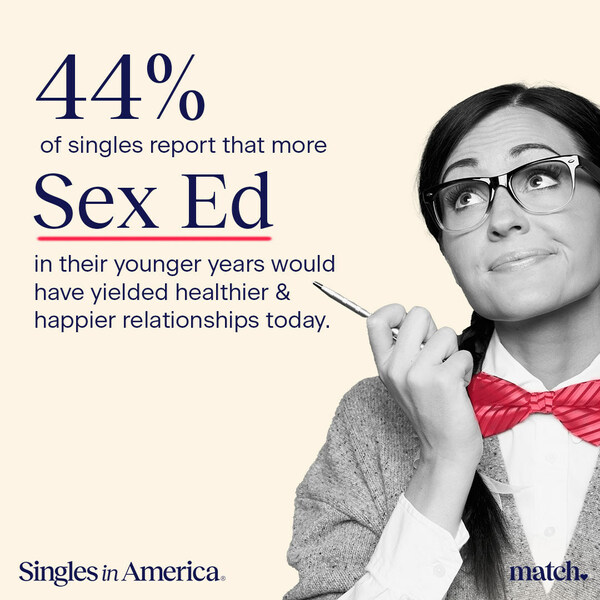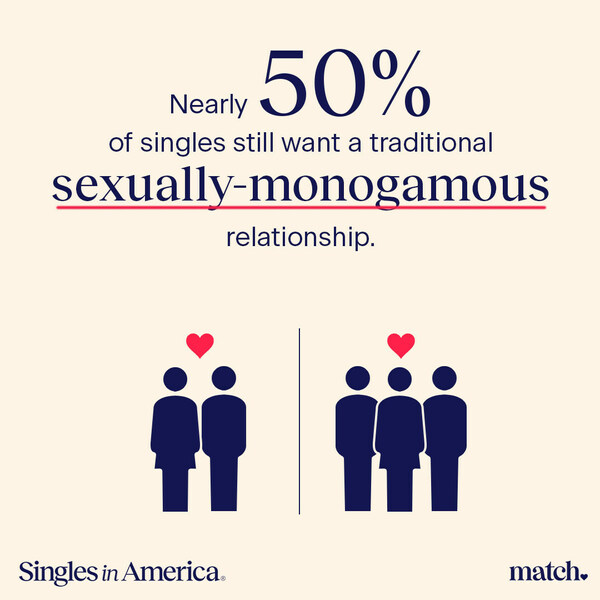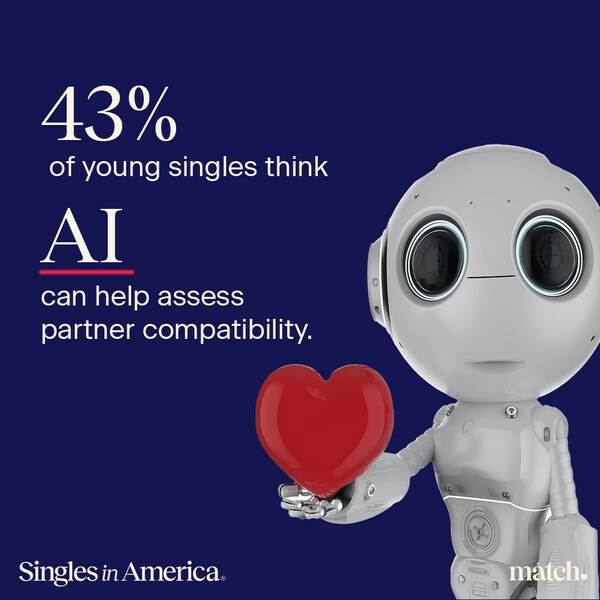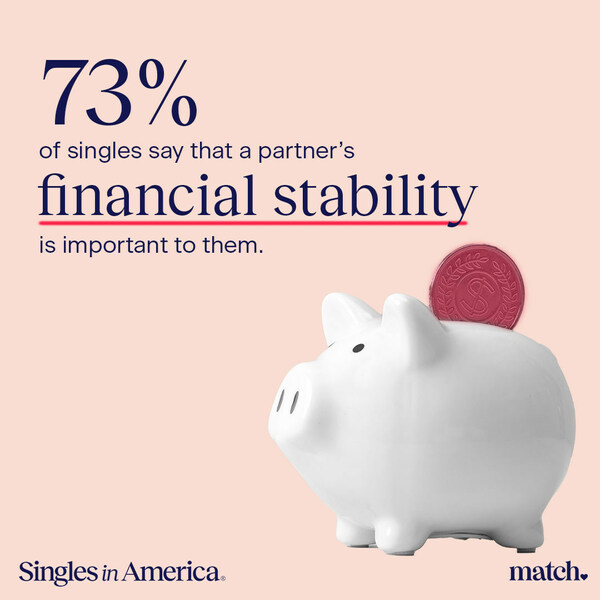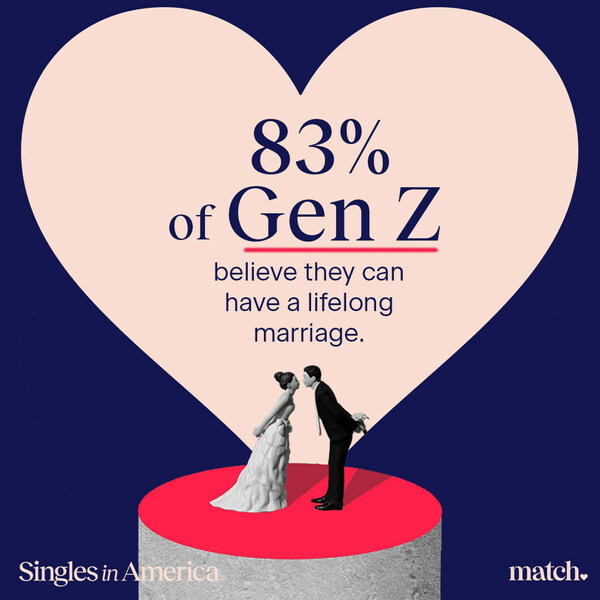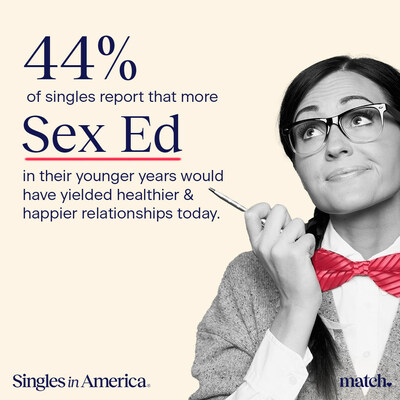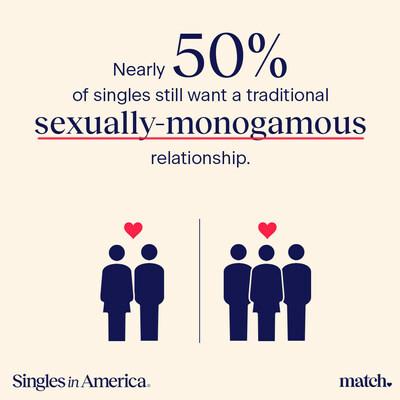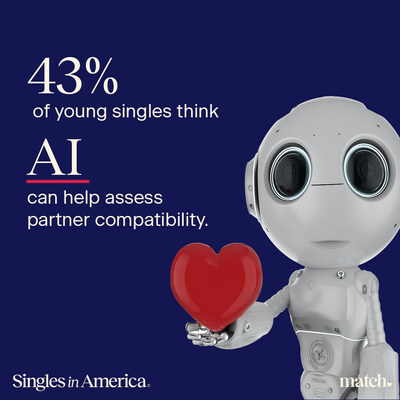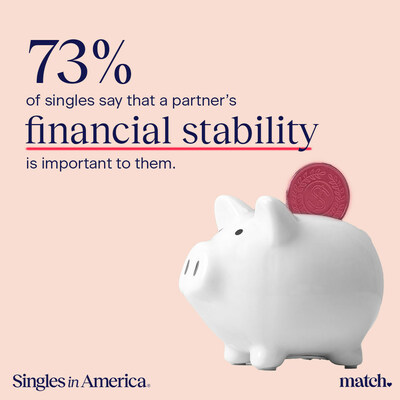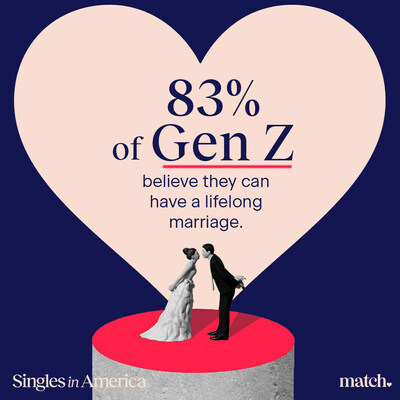Singles Say Better Sex Ed Leads to Healthier Relationships
Finances Rank as Top Stressor for 2nd Year in a Row
More Than 4 in 10 Young Singles Think AI Can Increase Partner Selection and Compatibility
DALLAS, Jan. 24, 2024 /PRNewswire/ -- Match today released findings from its 13th annual Singles in America study, the nation's largest and most comprehensive annual scientific study of single adults, more than one-third of the U.S. adult population. This year's study asked a national representative sample of 5,000+ singles their thoughts on dating and AI, non-monogamous relationships, comprehensive sex education, and more. Having run annually over the past 13 years, the study encompasses insights from 70,000 singles to date, showcasing major trends and new developments in sex, love and marriage.
"Single Americans are ushering in new trends in dating, demonstrating the influence and impact of their substantial demographic," said Dr. Justin Garcia, Scientific Advisor to Match and Executive Director of the Kinsey Institute. "Findings show that singles are adapting to some of our most significant social and political challenges, by seeking financial stability in partners to getting serious about accurate education on sexuality and relationships. Despite the political rancor over sex education, the data shows that most singles haven't received sex ed from reliable sources, with nearly half of single adults today saying that proper education would lead to happier and healthier relationships. Today's singles are hungry for tools to help them find and maintain human connection."
Singles Call Out For Better Sex…Ed
Nearly half of singles (44%) report that more sex ed (i.e. learning more about and communicating what you want, gender identity, consent, sexual orientation) in their younger years would have enabled them to have healthier and happier relationships today.
In newly released findings exploring America's sex ed dilemma, singles report that if they had received more information on sex ed topics early on they would:
- Have more sexual confidence now (40%)
- Know how to talk about sex with partners (32%)
- Know how to date more effectively (30%)
While singles report having received sex ed on concepts like reproduction (91%), puberty (89%), pregnancies (89%), testing/preventing STIs (84%), and abstinence (77%), they also identified key areas of intimacy where they didn't receive sex ed, including:
- How to talk about what you want (39%)
- Gender identity (38%)
- How to talk about sex in general (35%)
- How to give and ask for consent (31%)
- How to establish and/or discuss sexual orientation (26%)
When it comes to their sources of information on sex, singles have more often learned about sex from inconsistent and unreliable sources, including peers and pornography:
- How to have a positive or healthy romantic relationship: 25% learned about this from friends/peers, 26% from family, 24% learned somewhere else; while 7% learned from school.
- Sexual orientation: 31% learned about this from friends/peers, 16% from family, 28% learned somewhere else ; while 18% learned from school.
- Consent: 25% learned about this from friends/peers, 18% from family, 25% learned somewhere else; while 17% learned from school.
Monogamy has Staying Power
"Polyamory and other forms of sexual exploration are thriving. But this practice is far from undermining traditional monogamy—it's enhancing it. These singles say their sexual adventures have given them meaningful insights into what they really want in a long-term, stable partnership. In fact, nearly 50% of singles still want a traditional sexually-monogamous relationship. This cultural trend can't kill the human drive to find the one," says Dr. Helen Fisher, Match's Chief Scientific Advisor.
Half (49%) of singles say that traditional sexual monogamy is their ideal sexual relationship. But nearly 1/3 of singles (31%) have had a consensually non-monogamous relationship at some point - 16% of whom saying they would have a non-monogamous relationship again in the future. Among those who have practiced non-monogamy, singles reported the diverse relationship structures involved:
- Monogamish (21%): Committed relationship that allows sexual variety with others
- Polyamory (11%): Where relationship partners agree they may have a romantic relationship with other people
- Open relationships (13%): A committed primary relationship that openly allows for romantic and/or sexual activity with other
- Swinging (12%): Expanding an exclusive romantic relationship to seek out other sexual partners together
Many singles who have engaged in consensual non-monogamy felt the experience had a positive impact on their dating life:
- 38% say their non-monogamous experiences have made them better understand what they do and don't want and need in a relationship
- 30% of single people report becoming more open sexually
- 29% say they became more emotionally mature
- 27% say they were able to have more frequent sex
But not every single American is expanding their sex life. Just over one in five of today's singles (21%) state that they don't want a sexual relationship right now.
PS. AI Love You
"A new trend is emerging: Artificial Intelligence is helping singles connect more effectively. 14% of online daters have already used AI for dating. And that's most likely just the beginning––because 32% of these men and women say that AI has helped them get better matches and meet potential partners faster," says Dr. Helen Fisher. "AI is positioned to become a vital new tool for finding love."
How are daters using AI?
- AI in dating is still in early stages, with 6% of all single daters using AI in their dating life.
- 43% of AI users used the technology to write their dating app profile
- 37% of AI users used it to help them write a first message
How efficient do daters find AI? Of those who have harnessed AI for dating:
- 27% reported that using AI helped them get better matches
- 26% received more matches using AI
While the ancients relied on Cupid, 1/3 of all singles surveyed, including 43% of young singles, think AI can be their matchmaker, capable of assessing partnership compatibility.
When asked what they would want from AI when it comes to dating:
- 34% want help sorting their matches
- 29% want help creating their profile
- 30% want help coming up with conversation topics on a date
Singles Seek Savers
Americans' social lives respond to an unpredictable economy. For the second year in a row, singles listed money issues as their top stressors: Personal day-to-day finances (24%) topped the list, followed closely by concerns over the economy and also over inflation (both at 21%). But singles are also ushering in new norms for managing these money-related stressors: 64% of singles say they have a monthly budget, and 73% of singles say a potential partner's financial stability is important to them. The days of not discussing finances on a date are long gone.
Dating Gets the Gen Z Glow Up
Gen Z is feeling pressure in life when it comes to the economy, their careers, and their mental health, but less so when it comes to dating: 90% of Gen Z feel significant stress, specifically due to their finances (24%), physical health (22%), and mental health (22%), while their dating lives fall lower on the list (16%).
This generation of singles is working on themselves, know what they want in a long term partner, and believe in marriage and the future of relationships:
- 45% of Gen Z singles have been working to better their mental health
- 57% were interested in attending a therapy session or had already done so this year, compared to 48% last year
- 39% say their physical health is poor or fair, but 41% are working to improve this
- 58% report they feel lonely on a typical day
- 57% want to get married
- 83% believe they can have a lifelong marriage
- 78% have been passionately in love
- 64% want a partner who wants to marry
- 57% want a partner who wants children
Relationship and Dating Discourse
"Boundaries," "trauma," "feeling triggered," "gaslighting" – therapy language has infiltrated dating conversations, but singles think you can take it too far!
- 1 in 3 singles (33%)—regardless of age or gender—feel that therapy speak is a mixed bag: it can be useful, but can also be detrimental
- Nearly 40% of young singles think that therapy language promotes a better understanding of mental health (vs. 28% of Gen X, 20% of Boomers)
Healthy Relationships: Singles identified their top three most important factors in a healthy romantic relationship as trust, effective communication, and mutual respect.
Past Relationships Prove to be Stepping Stones to Better Future Relationships: 76% of singles reported that their past dating experiences helped define who they are today, and what they want in future relationships.
To help shape future relationships, singles are counting on a wide variety of important resources for dating advice, including:
- Friends: 65%
- Family: 46%
- Therapist: 26%
- 1 in 10 asked an ex-partner
- 23% of Gen Z turn to influencers/content creators (vs. 19% Millennials, 10% Gen X, 11% Boomers)
Singles at the Ballot Box
With adult singles representing over 1/3 of the U.S. population, 2024 election candidates and pollsters may be overlooking the power of the single voter. 14% of all singles don't plan to vote in the upcoming presidential election, a figure that jumps to one in five of Gen Z singles (20%).
The overturning of Roe v. Wade has impacted the dating and sex lives of nearly 9 in 10 singles (87% of daters under age 50) since the 2022 ruling to reverse the landmark legislation, a jump from 78% last year. How have singles been impacted?
- 12% of singles say they feel more hesitant to date and 11% report having sex less often. 10% of singles feel more nervous or anxious during sex (9% of men, 12% of women, while 13% say they are more afraid of getting pregnant or getting someone else pregnant. 13% of singles (14% of men and 12% of women) also report using condoms more often since the overturning.
- 22% of singles say abortion legislation will completely determine their vote (including 26% of women, 18% of men; 30% of Democrats, 20% of Republicans and Libertarians, 19% Independents, and 14% of singles with no political affiliation)
- 70% of singles say a candidate's view on abortion will have some impact on how they will vote
- Overall, 60% of singles report being pro-choice, while 23% are pro-life/anti-abortion
"American Singles are reckoning with the impact of Roe v Wade and abortion legislation on their lives, with these startling findings showing that legislation has entered people's bedrooms to alter behavior, comfort, pleasure, and the meaning of intimacy in today's relationships," said Dr. Justin Garcia.
To see the full findings, including additional demographic breakdowns, please visit: www.SinglesinAmerica.com
About Singles in America
Singles in America (SIA) is funded by Match and conducted by Dynata in association with renowned anthropologist Dr. Helen Fisher and evolutionary biologist Dr. Justin Garcia of The Kinsey Institute at Indiana University. The 2023 study is based on the attitudes and behaviors taken from a demographically representative sample of 5,305 U.S. singles between the ages of 18 to 98. Generations are defined as: Gen Z (18-26), Millennials (27-42), Gen X (43-58), and Boomers (59+). Young singles are defined as the combination of Gen Z and Millennials. Singles in America remains the most comprehensive annual scientific survey of single Americans.
SOURCE Match.com
